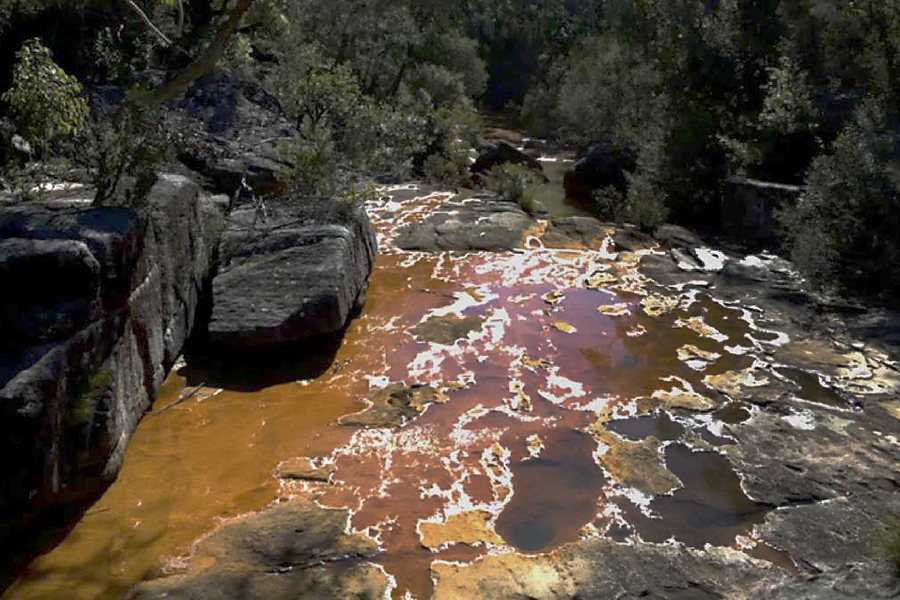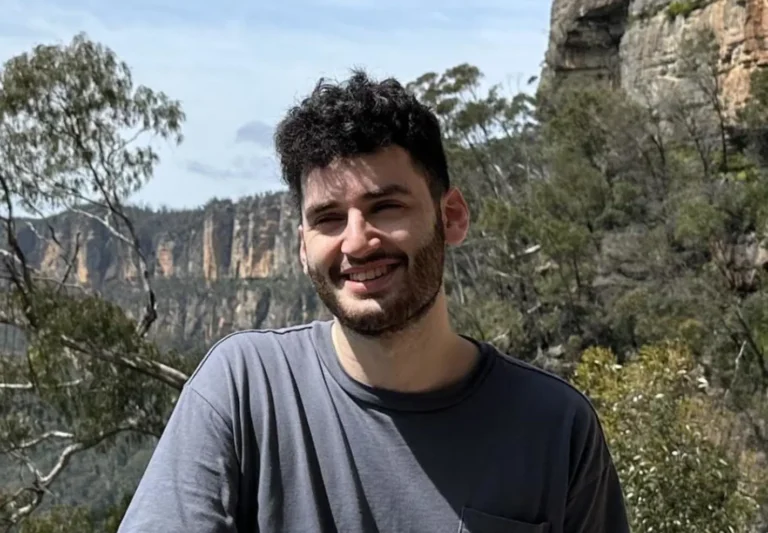

By MERRILL WITT
Last month, NSW Planning Minister Rob Stokes granted final approval for coal mining in three new longwalls, two of which will go beneath the heritage-listed Woronora reservoir that supplies water to Sutherland Shire and the northern suburbs of the Illawarra.
Coal mining has already been blamed for disappearing water flows and contamination in tributaries leading into this dam. The damage to the waterways was considered so alarming that last year environmental and community groups teamed up to try to stop the final approvals from going ahead.
In February, the Sutherland Shire Environment Centre submitted a 10,000 plus signature petition to the Government, calling for parliament to consider “whether mining under the water catchment risked the integrity of the Shire’s water supply and was in the public interest.”
The matter was scheduled for debate on the floor of parliament on 26 March, just one day after it was suspended until September. “It shows complete contempt for the community that they approved this even prior to the now cancelled debate,” Catherine Reynolds, executive director of the Sutherland Shire Environment Centre, said.
If you’re starting to wonder whether democracy is the latest casualty of the coronavirus pandemic, you’re not alone. But you would be wrong to think that our current catastrophe is the only reason why your rights to object to planning proposals and decisions have been curtailed.
Over the past decade, rights to object to development applications have been eroded.
Over the past decade, the state government has made it increasingly difficult for the public to voice their concerns about planning matters. Just a few examples from a long list of enacted constraints include restrictions on the rights to protest, limited access to the appeal process and, most recently, the use of geographical proximity to “state significant” development as one of the criteria for the right to lodge an objection.
The Government’s oft-repeated rationale for these types of measures is that unnecessary and unwieldy “red” and “green” tape must be removed in order to facilitate economic growth and to provide “certainty” for both developers and the community.
Ironically, when the Coalition government was first elected in 2011, Premier Barry O’Farrell promised to “return planning powers to local communities.” Unfortunately, this pledge didn’t sit well with competing demands from developers to make the planning system simpler and faster.
As a consequence, O’Farrell’s vaunted planning reforms in fact led to forced council amalgamations, unsolicited development proposals and the designation of planned priority precincts across Sydney. These policies and a host of other changes effectively overrode community sanctioned local development controls and opened the floodgates for developers.
Pro-developer planning changes undermine the integrity of the planning system
One of the major catalysts for a series of pro-developer planning changes was mining lobby pressure after the NSW Supreme Court dismissed an appeal by Warkworth Mining Ltd to have a 2013 Land and Environment Court decision overturned. The lower court had overruled the Planning Assessment Commission’s (PAC) approval of Warkworth’s planned expansion of an Upper Hunter coal mine.
The Bulga-Milbrodale Progress Association sought to have the PAC approval withdrawn because, as the president of the Association John Krey put it, “we saw that the village of Bulga would go the same way as the villages of Ravensworth, Warkworth and Camberwell, where the expansion of open-cut mines made their villages unliveable.”
The Chief Judge of the Land and Environment Court, Brian Preston, agreed with Krey’s prognosis, stating in his judgment that “the economic benefits of the coal mine did not outweigh the significant impacts on Bulga residents and the destruction of rare forests containing endangered plant and animal species.”
In a democracy, the courts are typically politically neutral forums and the final arbiter of disputes. Hence, the only way for the mining lobby to effect a different outcome was to convince the Government to change the law. And that’s exactly what happened.
In 2013, parliament approved a new mining State Environmental Planning Policy (SEPP). It removed the provision requiring a planning authority to balance the economic benefits of a proposed project against the social and environmental costs. Instead, it said that the economic significance of the resource should be “the principal consideration” when determining approval for mining projects.
The revised SEPP paved the way for the Rio Tinto owned Warkworth Mine to resubmit its DA to the PAC. Krey was understandably livid. “They’ve got all the rules in place so the PAC can’t refuse the application. That’s disgraceful and it’s not democracy,” he said.
With respect to rules, Krey was also referring to the planning minister’s decision to direct the PAC to hold a ‘Public Hearing’ as part of its deliberations on the new Warkworth Mining DA. The hearing requirement automatically extinguishes the rights of third party objectors to seek a merits review in the Land and Environment Court.
Denying third parties the right to appeal is understandably controversial. The EDO NSW noted in its 2016 report, Merits Review in Planning in NSW, that “rights, liberties and obligations of citizens should not be unduly dependent upon administrative decisions which are not subject to review on its merits.” Disempowering objectors not only undermines the quality of decision-making in planning matters, the report argued, but it threatens the integrity of the planning system.
Government responds to community backlash
Notwithstanding the submission of the new DA, the future of Bulga looked a little brighter when a new planning minister, Rob Stokes, pretty much acknowledged that the Government had miscalculated the level of community angst about the new SEPP. Even the influential radio host Alan Jones had attended rolling protests held by farmers and regional community groups.
In 2015, Stokes announced that the SEPP was being amended to “reflect the importance of balance in assessing the likely impact of mining developments” and to “restore community confidence in the planning regime.”
Unfortunately, the amended SEPP didn’t stop the PAC from approving the Warkworth coal mine expansion. The 300 plus residents of Bulga had no choice but to accept the finality of the PAC’s decision and to witness the demise of their little town.
Climate change cited as a key reason for refusal of mining projects
Fast forward to February 2019 and Gloucester, another picturesque town in the Hunter Valley region not far from Barrington Tops National Park, was celebrating its own Land and Environment Court win. This time, the Court had agreed with the PAC’s decision to refuse Gloucester Resources Ltd’s proposal for a new open-cut coal mine at Rocky Hill.
The “Rocky Hill Coal Mine” decision was ground-breaking because for the first time in NSW the contribution of a proposed mine’s emissions to climate change was one of the key reasons cited for refusing the application.
Chief Judge Preston’s judgment acknowledged that the coal product from the mine “will increase global total concentrations of GHGs (Green House Gases) at a time when what is now urgently needed, in order to meet generally agreed climate targets, is a rapid and deep decrease in GHG emissions.”
The ruling set a precedent that influenced subsequent decisions of the NSW Independent Planning Commission (IPC). In September 2019, for example, the IPC rejected the Bylong Coal Project, citing among other factors climate change concerns.
In many respects, both the Court and the IPC were responding to a Government policy vacuum with respect to climate change. As Judge Preston observed in the Rocky Hill Coal Mine judgment, “Developed countries such as Australia have a responsibility, including under the Climate Change Convention, the Kyoto Protocol and the Paris Agreement, to take the lead in taking mitigation measures to reduce GHG emissions.”
Government proposes changes to laws to accelerate coal mining projects
Even before this past summer’s bushfire disaster, a Guardian Essential poll found that at least 60% of Australians don’t think the government is doing enough to reduce the risks of climate change.
Yet public sentiment hasn’t stopped the Government from proposing a new amendment to the mining SEPP to remove the requirement to consider downstream emissions (ie. emissions released after coal or gas is sold overseas).
The Government also plans to amend the Environmental Planning & Assessment Act 1979 so that planning authorities are prohibited from imposing conditions on developers related to downstream emissions.
Once again, it has justified the proposed changes to the laws by emphasising the economic benefits. Discussing the planned amendments in an October interview with the ABC, Deputy Premier John Balirao said, “That’s probably more evident today, in the midst of the worst drought in recorded history, that mining is underpinning the jobs in regional and rural New South Wales. We need to find a balance and we need to find clarity.”
Around the same time, the Planning Minister announced a snap Productivity Commission review of the IPC. Stokes repeated the Government’s familiar refrain that New South Wales was “open for business” as justification for a review of the IPC’s mandate and responsibilities.
Democracy is a “conversation”
The former US political candidate and current political activist, Stacey Abrams, recently described democracy as a “conversation.” To work effectively, she argues, democratic governments must encourage input from their citizens and not choke off avenues for people to have their say.
Unfortunately, a number of the 12 recommendations made by the Productivity Commission to “improve the IPC’s independence, governance and performance” reflect a different perspective on the value of encouraging community consultation.
The tightening of referral triggers and criteria for proposals to be referred to the IPC, for example, has been raised from 25 to 50 ‘unique’ objections. And, for the first time, individual objections must now only come from residents living within a specified distance of the project.
Independent NSW MP Justin Field articulated the problematic and undemocratic nature of this recommendation, noting that the 100 km radius restriction may “make sense in the city, but when a coal mine or gas project could impact on a river or groundwater system relied on by landholders hundreds of kilometres away, it’s unfair and a gift to the proponents of potentially damaging projects.”
In February, Stokes said that the Government would implement all of the Productivity Commission recommendations and that, in his words, the IPC would undergo a “significant transformation with new performance benchmarks, streamlined processes, and greater accountability.”
But these reforms could also have unintended and potentially costly consequences. In particular, the Productivity Commission’s recommendation that the IPC should be accountable to the Planning Minister and “responsible for delivering on the Government’s agreed objectives and performance measures” is not only undemocratic but risky.
It’s undemocratic because it weakens public confidence in the planning system by removing the perception that as an ‘independent’ body the IPC operates at “arms-length” to the government.
It’s risky because, according to Lock The Gate Alliance coordinator Georgina Woods, the IPC’s responsibility to deliver so-called outcome focused objectives could end up tying its hands no matter the impacts on the community, environment, climate and water resources.
Dr Alex Millmow, Associate Professor of Economics at Victoria’s Federation University, recently told the ABC’s Jonathan Green that we’re now witnessing “the greatest crisis to capitalism since the Great Depression” in the 1930s. He predicts a “sea change in economic and political philosophy” that will lead to a reassessment of the role of government in our lives. Time will tell which way the pendulum swings, but this current crisis has certainly highlighted that only the government has the resources and tools to protect our collective health, which depends on protecting the health of our environment.
Consequently, a rethink of the wisdom of shutting down disruptive oppositional voices to ill-conceived pro-developer planning policies is long overdue. Reinvigorating our democracy will not only help us to secure a better future for ourselves, it will also save lives and the environmental health of our planet.









